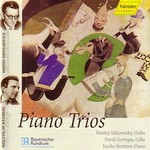
Piano Trios
 $41.00
Out of Stock
$41.00
Out of Stock6+ weeks add to cart
WEINBERG / WEPRIK / SHOSTAKOVICH
Piano Trios
David Sitkovetsky (violin) David Geringas (cello) Jascha Nemtsov (piano)
[ Hanssler / CD ]
Release Date: Friday 11 January 2008
This item is currently out of stock. It may take 6 or more weeks to obtain from when you place your order as this is a specialist product.
"Nonetheless this new version must be regarded as a strong front-runner, particularly given the unusual interest of the rest of the disc." BBC Music Magazine
"With so many fine recordings of Shostakovich's Piano Trio No.2 available, one could easily quesrion rhe justification for the release of yet anorher version. Not in this case, however. Pianist Jascha Nemtsov, instigaror of an auspicious series of CDs that specifically explore the neglected repertory of Russian composers of Jewish origin, has here devised a brilliantly imaginarive and clearly recorded programme ~~ presenting the angst-ridden Shostakovich wirhin the context of other works that betray a similar influence from Jewish folk music.
The major discovery is the 1945 Trio of Shostakovich's friend Mieczyslaw Vainberg. This is a bold and deeply unsettling work betraying the scars ofwar and in particular the composer's own tragic circumstances as the only member of his family to have escilped the Nazi atrocities. Not surprisingly, perhaps, there are some obvious structural similarities between his Trio and the Shostakovich, which was completed a year earlier: this is most evident in the chorale that opens the slow movement, and in the evocative reference to material from earlier movements at the end of the Finale. Yet for all Vainberg's indebtedness to his older colleague, in no sense does the Trio resort to slavish imitation. True, the tortuous emotional journey that is explored here incorporates the strange, almost schizophrenic changes of mood that recalls Shostakovich. But Vainberg's idiom is in some ways even more disconcerting, the wild Jewish frenzy of the Scherzo casting a shadow over the rest of the work and inspiring a sequence of introverted melodic soliloquies which actually seem to anticipate Shostakovich's late works. Another prophetic feature ofVainberg's Trio can be gleaned at the outset where the declamatory chords in a major key sound distinctly gloomy, an effect that both Shostakovich and Alfred Schnittke borowed to powerful effect.
After the Vainberg, given a powerfully intense and strongly committed performance, the unassuming miniatures from Alexander Veprik provide welcome respite. Then the despair of the Shostakovich sets in with David Geringas's unnerving but sensitively phrased cello harmonics, to which Dmitry Sitkovetsky responds with a suitably lean yet anguished melodic line, and from that. moment onwards, the performers respond with razor-sharp precision and insight to the bewildering transformations from anger and aggression in the Scherzo through the funereal despair of the Passacaglia and to the grotesque dance of death in the Finale.
From time to time there are nuances in other fine recordings that capture a special resonance...Nonetheless this new version must be regarded as a strong front-runner, particularly given the unusual interest of the rest of the disc." BBC Music Magazine
Tracks:
1Trio for Piano, Violin and Violoncello op. 24 (Weinberg)
Three Folk Dances/Drei Volkstänze op. 13b (Weprik)
Trio for Piano, Violin and Violoncello op. 67 (Shostakovich)



